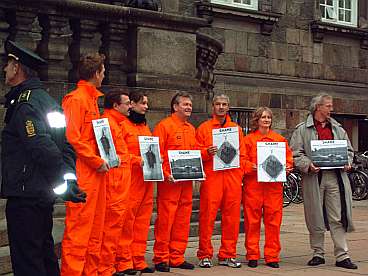NATO: bad news on all fronts
NATO: bad news on all fronts
“Neither terrorists, nor failed states nor the proliferation of weapons of mass destruction present us with our greatest threat. By far the biggest danger facing the world is the structural shortage of welfare, democracy and peace. The billions spent on armaments by NATO countries would therefore be better invested in the social, economic and democratic development of the world. It is this which we should be debating here.”

Demonstration in Copenhagen against the CIA's secret transport of prisoners (Tiny Kox on right)
With this pronouncement this week in Copenhagen SP Senator Tiny Kox took an emphatic position against a nevertheless successful resolution of NATO's parliamentary assembly in favour of giving the world's biggest military organisation more power and more resources to enable it to perform more rapidly and with greater flexibility. Senator Kox also expressed his opposition to the assertion of Secretary General De Hoop Scheffer that nobody was calling any longer for a fundamental debate on NATO's right to exist.
During the assembly's annual meeting, representatives of the parliaments of the member states were informed about current NATO operations in Afghanistan, Iraq en Kosovo. Bad news came from all fronts. In Kosovo no acceptable solution to the lingering conflict is in sight and the gap between different population groups grows ever wider. In Iraq NATO, at the request of the national government, is training the army and police to help stabilise the country. The British-American occupation, however, daily provokes new resistance. Iraq has in the meantime become a breeding-ground and battlefield for terrorists, in which the British and Americans sink ever deeper into a military morass of their own creation and one into which NATO could be dragged. Yet NATO is considering broadening its operations in that country. In Afghanistan the Taliban and Al Qaida have been defeated, but the country is now dominated by drug barons, warlords and corrupt politicians. No respectable executive exists, and no political system with political parties. The parliament is elected along ethnic lines and is heavily influenced by regional leaders.
Secretary-General De Hoop Scheffer, in his speech before the assembly, insisted on closer cooperation in Afghanistan between the NATO-led peace mission and the American operation ‘Enduring Freedom’. Many member states oppose this because the Americans are conducting their war with no thought to unity with the NATO-led reconstruction mission in the rest of the country, while the abuse of international law by the Americans in relation to the treatment of prisoners is meeting resistance, including from Denmark In front of the main entrance to the Danish parliament, MPs from the Red- Green Alliance were joined by the SP Senator in a demonstration against the secret transport by the CIA, via European countries (Denmark amongst them) of prisoners to and from Afghanistan and Guantanamo. Another parliamentary assembly, that of the Council of Europe, has recently begun an enquiry into this latest breach of international treaties governing treatment of prisoners of war. In Afghanistan resistance to foreign troops also appears to be growing. The Netherlands has made troops available in Afghanistan to both NATO and the Americans and has plans to extend the military presence in the country, increasing the risk of the country being ensnared within operations which are in conflict with each other.
The NATO assembly also approved a resolution calling on Russia to take measures in connection with the country's huge stock of weapons of mass destruction. This resolution was supported by the SP, though Senator Kox remarked that a similar resolution should now be directed at the United States, which in reality possesses the majority of the world's WMDs.
